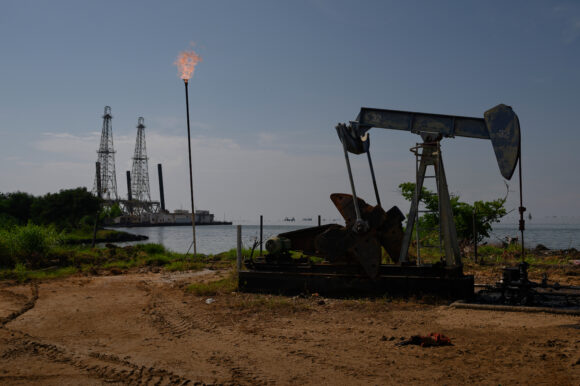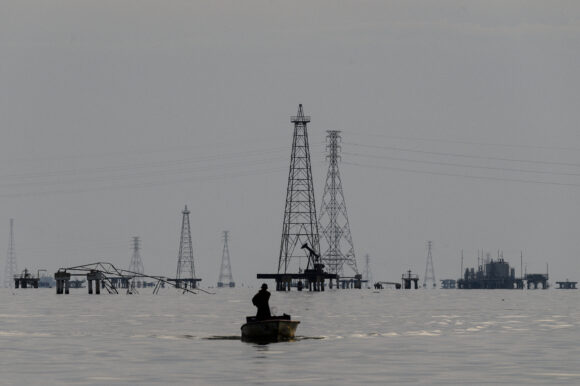The Trump administration’s latest attempt to isolate Nicolás Maduro’s government further complicates day-to-day operations for foreign oil companies in Venezuela, experts say.
On Monday, the administration designated Cartel de los Soles as a foreign terrorist organization that it says is led by the Venezuelan government and run by the military. The FTO label “significantly increases the risk exposure of oil companies operating in Venezuela,” Jeremy Paner, a sanctions lawyer at Hughes Hubbard, said in an email.
While longstanding sanctions apply to discrete entities and individuals, the broadly worded FTO designation makes it hard for companies to know who might pose a risk. Venezuela’s military, for example, runs the ports that are critical to the oil operations.
A handful of oil companies, most prominently Chevron Corp., remain in Venezuela amid increasingly adverse operating conditions. Coming on top of years of economic sanctions, the FTO designation follows nearly three months of lethal attacks on alleged drug-running boats in the Caribbean and eastern Pacific. US President Donald Trump has warned that land strikes on Venezuela could be next, even as he hints about possible talks.
Paner noted that a US Treasury Department license that authorizes Chevron to operate in Venezuela as an exception to sanctions doesn’t shield the company from “extraterritorial civil liability” in the US for harm deemed to be caused by the cartel.

“Those civil actions take years to resolve and are very expensive to defend,” Paner said. “If an oil company knows it is dealing with the cartel, liability is triggered even if it is not significant assistance,” he said, citing a recent Supreme Court case involving an FTO.
Paner added that the companies “face potential extraterritorial US criminal exposure for providing ‘material support’ such as funds or services to the cartel.”
Nicholas Mulder, a Cornell University professor who has written a book on sanctions, agrees. “While OFAC retains ultimate discretion through its ability to issue licenses, there is certainly an increased legal risk in this FTO designation for companies doing business with Venezuelan state-owned entities,” Mulder said.
“On the whole this is meant to increase the long-run risk perception of corporations as part of an ongoing US strategy to ramp up pressure against Maduro,” he added.
Any interaction with the Venezuelan military could be perilous for the companies, said José Ignacio Hernández, senior specialist at consultancy Aurora Macro Strategies.
“The big unknown is that while the definition of the Venezuelan government as an object of sanctions is easy, there is no list for the Cartel de los Soles,” he said. “For Chevron this implies greater regulatory compliance risk. They are going to have to find a way to ensure that the people they are interacting with are not members of the Cartel de los Soles.”
Ports Risk
Venezuela’s military-run ports are particularly hazardous for the companies, Hernández said. “It’s not that this determination makes Chevron’s operations in Venezuela unviable, but for an operation that was already complicated it adds another more imprecise burden.”
To mitigate risk, any ambiguity in the FTO’s reach will likely to lead to over-compliance by the oil companies and their networks of contractors, he added.
Chevron’s activities continue in full compliance with laws and business-as-usual, the company said on Monday, with top priorities set on personnel safety, Venezuelan communities surrounding its operations and the integrity of its joint venture assets.
“The kinds of swings that you see in places like Venezuela are challenging but we play a long game,” Chevron’s Chief Executive Officer Mike Wirth said on Nov. 19, before the designation.
The Houston-based company currently accounts for up to a quarter of Venezuela’s oil production. Half of the output goes to Chevron’s state-owned partner, Petróleos de Venezuela SA, which ships most of its oil to China. Chevron exports its share of the production to the US market.
Other foreign oil companies that operate in Venezuela include Spain’s Repsol SA and Italy’s Eni SpA. Neither immediately replied to multiple email requests for comment. French-listed Maurel & Prom, which is controlled by Indonesia’s state-owned PT Pertamina, could not be reached comment.
The US government says the Cartel de los Soles is a drug-trafficking organization led by Maduro and run by senior army officers. The Treasury Department on Monday updated OFAC’s Specially Designated Nationals and Blocked Persons list entry for the cartel, adding the FTO designation alongside its existing Specially Designated Global Terrorist or SDGT status. The group remains subject to secondary sanctions.
In the Americas the US has also slapped the FTO designation on Mexican, Ecuadorian and Colombian cartels and Venezuela’s Tren de Aragua.
Top photograph: Fishermen in front of oil rigs on Lake Maracaibo in Cabimas, Zulia state, Venezuela. Photo credit: Bloomberg
Was this article valuable?
Here are more articles you may enjoy.



 Lemonade Books Q4 Net Loss of $21.7M as Customer Count Grows
Lemonade Books Q4 Net Loss of $21.7M as Customer Count Grows  CFC Owners Said to Tap Banks for Sale, IPO of £5 Billion Insurer
CFC Owners Said to Tap Banks for Sale, IPO of £5 Billion Insurer  Preparing for an AI Native Future
Preparing for an AI Native Future  Insurify Starts App With ChatGPT to Allow Consumers to Shop for Insurance
Insurify Starts App With ChatGPT to Allow Consumers to Shop for Insurance 

